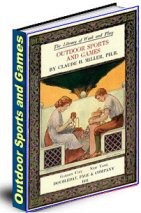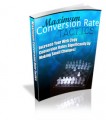 License Type: Resell Rights
License Type: Resell Rights  File Size: 3,276 KB
File Size: 3,276 KB File Type: ZIP
File Type: ZIP
 SKU: 16238
SKU: 16238  Shipping: Online Download
Shipping: Online Download
Ebook Sample Content Preview:
Whether a boy of fifteen should have a gun or a rifle is a question that parents will have to settle for themselves. There is no question but that a careful boy who has been taught by some older person how to handle a gun is more to be trusted than a man who has never learned the proper use of fire-arms and who takes up the sport of hunting after he is grown up. Most of the shooting accidents are caused by inexperienced men who have never been accustomed to guns in their younger days. Once or twice I have just missed being shot by friends who had never been hunting before, and who became so excited when they unexpectedly kicked up a rabbit or walked into a flock of quail that they fired the gun without knowing whether any of their friends were in range or not. When a boy is allowed to have a gun it should be a real one. Air rifles and small caliber guns are all the more dangerous, because they are often looked upon as toys.
In handling a gun, always treat it as though it were loaded, no matter if you know it is empty. By this means it will soon become second nature to you never to point the gun at any one even carelessly or in fun. A guide once said to me, “A gun is a dangerous critter without lock, stock, or barrel, and if a feller ever points one at me I think he means business.”
A gun can never be trusted. Accidents happen so quickly that it is over before we know it and the terrible damage is done. Sometimes the trigger will catch on a coat button or a twig, and, bang! an unexpected discharge takes place and if you were careless just for an instant, it may cost some one his life. Especial care must be taken in loading and unloading a gun. It is at this time that a gun is most likely to go off unexpectedly.
The best way to learn how to handle a gun is to watch the methods of an old hand. Never fire a gun when you are standing behind another person. You may know that you are not aiming at him, but the concussion of the air near the end of the barrel is terrific, and your friend may have a split ear drum as a result. A shot-gun is better for a boy than a rifle, for the reason that most real shooting except for big game is done with a shot-gun, and besides, it takes a lot of practice to shoot well with it. A shot-gun is not a weapon for play but a real tool. In almost every section of the country there is some small game to be hunted and there is usually also an opportunity to practice at clay pigeons.
No one would think of hunting quail, ducks, or rabbits with a rifle, and even if you were an excellent rifle shot at a still mark you might not be able to hit moving game at all. A shot-gun is less dangerous for the reason that its range is limited to a little over a hundred yards, while a rifle may carry a mile. A cheap shot-gun is far more dangerous than a cheap rifle. Until it is possible to buy a good one it is better to have none at all. A good American-made gun can be bought for about twenty-five dollars. A gun suitable for its owner should fit just as his clothing fits him. When a gun is quickly brought to the shoulder in firing position, there is no time in actual hunting to shift it around. When you buy a gun, remember that your canvas or corduroy hunting coat makes more of a bulge at the shoulder than an ordinary suit and accordingly see that the stock is the proper length. The “drop” of a gun is the number of inches that the stock falls below the line of the barrel. If the stock is bent too much you will shoot under your game. If it is too straight the tendency will be to shoot over game. The average stock is made to fit most people and will probably answer most purposes unless you can afford to have a stock made especially. The principal thing is to do all your practicing with your own gun until it becomes second nature to bring it up quickly and have the eye find the barrel instantly. A shot-gun is not aimed in the same way as a rifle. The method of good shots is rather to keep their eye on the game and when they “feel” that the gun is pointed right to fire. A skillful shot can tell whether he is shooting too high or too low just as he pulls the trigger. The brain, head, and eyes and trigger-finger must all work in harmony or you will never be a good shot. Never flinch as you shoot. This is a very common fault of beginners and it is fatal to becoming a marksman.
The first lesson in handling a gun is to understand perfectly how it works. If it is a hammerless gun, remember that it is always cocked. When you open the barrels you cock the gun automatically. For this reason there is some kind of a safety device provided, which should always be left at “safe” except at the actual instant of firing. It is just as easy to learn to push the safety off when you fire as it is to learn to pull the trigger, if one starts right. Never carry your gun with your finger on the trigger. Wait until you put the gun up as you are ready to shoot. Don’t forget the safety. A great many shots are missed because the hunter forgets whether he has left it on or off and in his anxiety to hit the game will tug and pull on the trigger until, just as the game disappears out of range, he will remember that he did not release it. This shows the importance of acquiring the proper habit at first.
It is harder to correct bad habits in handling a gun than to teach the beginner the proper way at first. On your first lesson in the field, walk on the left side of your teacher so that your gun will be pointing away from him. If you come across any game, try to take your time before you fire. Nearly every one shoots too quickly. As most shot-gun shooting is what is called snap shooting, there isn’t much time at best, but a good shot will be sure that he has covered his game before he fires, while a beginner will trust to luck. This will be the hardest fault to correct. Consequently a beginner should if possible hunt alone for a while, as the presence of another gun alongside of him makes him too anxious to get in the first shot, and gets him into bad habits. If your teacher also has a gun, he must assure you that he does not intend to shoot and then you will try harder to get the game and run less chance of missing. Always unload a gun before going into a house, under or over a fence, or in or out of a boat or carriage. If you leave your gun, even for a minute, unload it. Never rest a loaded gun against a tree or building. Never pull a gun loaded or empty toward you by the muzzle. In unloading always point it toward the ground. A jar will sometimes discharge a gun and very often a discharge will take place when closing the breech on a tight shell.
- File Size:3,276 KB
- License: Resell Rights
- Category:Ebooks
- Tags:2008 Ebooks Resale Rights








